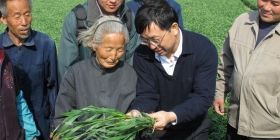Smallholder farmers who cultivate perhaps only a few hectares of land dominate the agricultural landscape in places like China, India, and sub-Saharan Africa. Increasing their efficiency while reducing their environmental impact are critical steps to ensuring a sustainable food source for the world’s growing population.
Yet sharing best practices with smallholder farmers, who often have limited resources to invest in their livelihoods and who number in the hundreds of millions in China alone, is a daunting prospect.
In a report in the journal Nature, the University of Pennsylvania’s Zhengxia Dou, professor of agricultural systems in the School of Veterinary Medicine, teamed with colleagues from China Agricultural University and other institutions in sharing the successful implementation of a long-term, broad-scale intervention that both improved yields and reduced fertilizer application across China. The effort, enacted over 10 years, engaged nearly 21 million farmers and increased yield on average more than 10 percent and lowered fertilizer use between 15 and 18 percent. Overall, the actions netted an increase in grain output with a decrease in fertilizer input and savings totaling $12.2 billion.
Continue reading at University of Pennsylvania
Image via University of Pennsylvania


